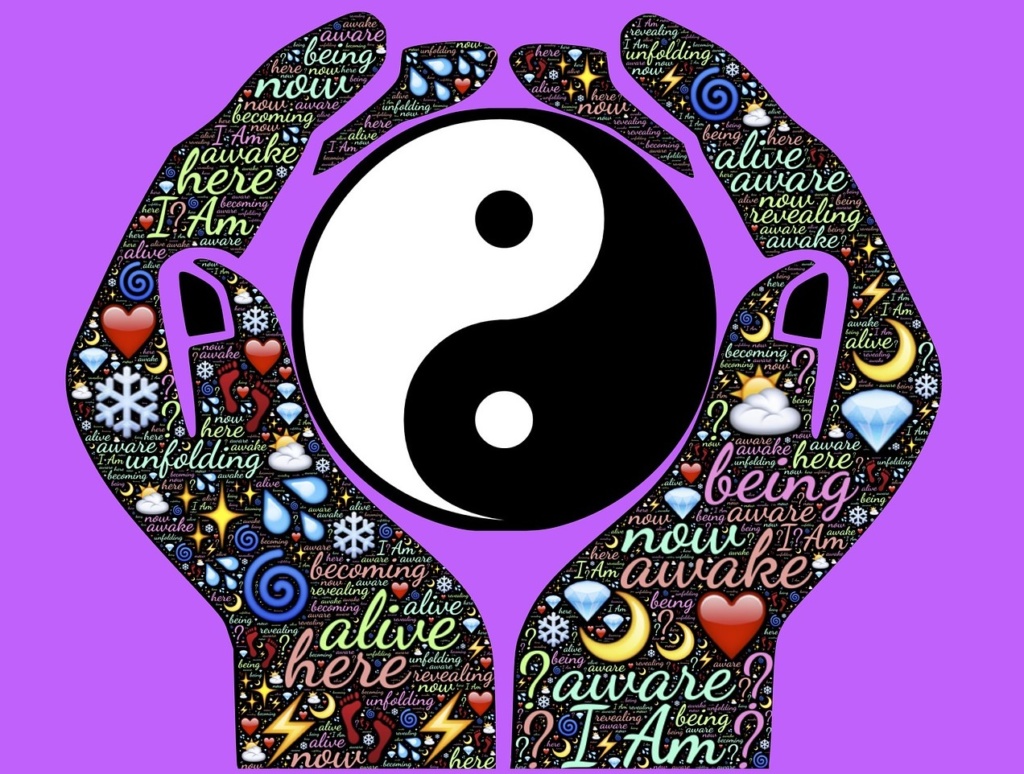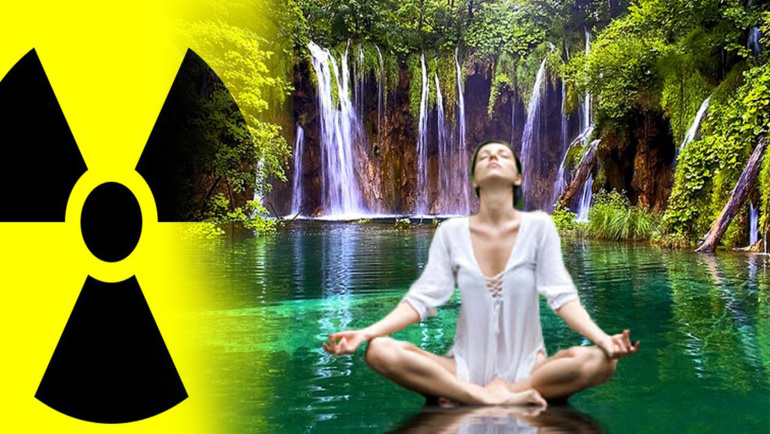
Looking at the evolution of the modern discipline of “environmental ethics” it becomes apparent to me that as humanity moves “forward” in some ways, moving “backwards” may serve it better. The modern movements of “Deep Ecology” or, perhaps “Eco-Feminism”, for example, only touch the surface of the transformation needed to heal the planet. There is a large out cry from many modern environmentalist platforms for immediate external intervention to reach a desired goal. This may help some however, I propose that this is the continual repeated pattern of humanity’s history; outrage at circumstances, pointing fingers at perceived enemies, civil unrest and dispute, and intervention and suppression by some force outside the self.
The key understanding for transformation is the idea of “self” and what that entails. I believe that Western thinking has a much skewed vision of “self “as evidenced by the vast numbers of those with a western mind who have an anthropocentric view of existence. This anthropocentric view can be explained not only by looking at traditional western Judeo-Christian ideas but, also, by looking at the beginnings of Western philosophy exemplified in the Platonic concept of a divide between the body and soul. This becomes the basis of the mind/body dilemma perceived and expressed by Descartes and helps set the stage for the compartmentalization of almost all aspects of life in the West. From medicine and the human body to nature and it’s phenomena to aspects of the professional world, such as divisions of labor into a specialization, the Western world is divided into parts. Due to this, for the Western mind in general, seeing the world as interconnected is a stretch of the imagination. It is my opinion that Eastern philosophies, especially Taoism, recognized the more subtle aspects of the “self” and how it is our projection and perception that create the world. I believe that a greater understanding of Taoism and its practice would lead to a deep healing of the planet.
The beginning, expansion, and decay of societies and civilizations are a macrocosmic reflection of the human psyche, an outward expression of our internal struggles and triumphs and our drive to meet needs and desires. Our civilizations become our reality and, in a sense, they themselves become their own living entity with a predictable pattern of meeting needs and desires as well in order to continue to survive. If this entity does not meet its needs, the civilization collapses. History itself has become its own organism with a rich full life that is constantly changing and adjusting, contracting and expanding and, following its own evolutionary pattern. As it evolves, it tends to repeat itself again and again in a seemingly never ending cycle of birth, growth, decay, death and rebirth. Recognizing this pattern when looking to history and having the wisdom to break the pattern is a great challenge.
Humans have a terrible tendency to run on auto pilot. Most humans are conditioned to behave according to social norms and expectations, much the same as Pavlov’s dogs, responding to rewards or punishment. Breaking deeply ingrained social norms requires first, a deep realization of a repeated pattern of behavior and, second, a desire to change the behavior. Humans need “eyes to see” (unknown).The Taoist perspective of balance and the concept of the microcosm as a reflection of the macrocosm is the point of the origin for the decay or preservation of our environment. In deciding that we are somehow distinct and separate from the whole of creation, a great disservice has been done to the planet.
Within Taoist thinking, the questions that arise in modern thinking are somewhat mute due to Taoist vision. All is interconnected in the Tao. How can one operate as anything other than nature if we are nature? There is no distinction, just a cosmic dance of yin and yang seeking a point of balance where all extremes neutralize. A recommendation of the way of the Tao is to follow nature. On following nature one must reach to achieve a state of wu-wei (non- action). Nature, itself, unfolds as it does and, as we are part of nature, the idea of “following nature” is the idea of allowing oneself to unfold in a graceful and natural manner. When too much force is exerted to create anything it is not able to flow and “follow its nature”, therefore, it is not allowed to achieve its true potential.
“The softest things in the world overcome the hardest things in the world. Non-being penetrates that in which there is no space. Through this I know the advantage of taking no action. Few in the world can understand the teaching without words and the advantage of taking no action” (43, Tao-te-ching).
So, as a lake is placid and calm, it is able to just be still until the wind comes around and moves the water. The water does not resist, but dances with the wind; the wind then stops and the lake has no mind of it because this is the way of nature; the way of the Tao. If one is able to be still and be in non-action, the nature of things is to create change and, with this gentle, subtle movement of nature, non-action evolves into action and then travels back to its root of non-action. One need not do anything as nature itself gently moves reality from one state of being to the next.
The virtues of this state are calm, non-forceful, gentle, subtle, soft and placid. This is a true state of a peaceful mind.
In understanding a Taoist perspective on government, one understands that freedom is the greatest of all gifts. Having the freedom to unfold and become is nature’s intention. “When horses lived free on the prairies, they ate grass and drank water. When they were pleased, they rubbed their necks together; when they were angry, they turned back to back and kicked up their heels at each other. This was all they knew. But once they were bridled and bitted and harnessed, they learned how to be vicious, how to get their head and bolt trying to get rid of the bit and the bridle” (Kalternnark, 100-101). When it comes to using government and policy is where, it seems to me, the modern environmental movement falls short. Arne Naess makes a perfect point that is in harmony with Taoist teaching in the first point of his deep ecology platform; “1. The well-being and flourishing of human and non-human life on earth have value in themselves (synonymous: intrinsic value, inherent value) these values are independent of the usefulness of the non-human world for human purposes”( Wiley-Blackwell.235). This is an example of where I see an echo of ancient Taoist teachings in a modern political movement; however, he falls short on points six and eight; “6. Policies must therefore be changed. These policies affect basic economic, technological and ideological structures. The resulting state of affairs will be deeply different from the present. 8. Those who subscribe to the forgoing points have an obligation directly or indirectly to try to implement necessary changes” (Wiley-Blackwell, 237). In my mind, the previous two points exemplify the place the modern environmental movement will encounter its greatest resistance. In trying to impose policies “wild horses are bridled” and they then become “vicious”.
Going back to a Taoist philosophy and the concept of the microcosm and macrocosm, the health of an individual can be analogous to the health of the planet. The sickness of the mind is reflected in the sickness of the planet. The basic premise of this statement implies that until humans are healthy from a holistic perspective, the planet will continue to suffer.
Humans have many addictions and those addictions must be fed. It is my theory that these addictions stem from a dissatisfaction or emptiness that creates a “hole” in the self that is never filled and, people are motivated by this “emptiness” to find something that will pacify what they perceive as a “lack”. They don’t know of what, just that there is a “lack”. This is where the addiction begins. The modern world is full of advertising and conditioning constantly bombarding us with a message that we are never good enough, pretty enough, rich enough, tall enough, thin enough, cool enough, etc., etc., in order to create a market to sell unnecessary or, even destructive merchandise. Maybe in this merchandise, the thing that will fill the hole may be found. We are trained to consume and, in this seeking outside the self, we create a deeper and deeper void that can never be filled with the latest fashions or cell phones. The “hole” gets bigger and, until people realize that they are the “emptiness” and the “emptiness” is not bad, it just is, they will never be satisfied. No amount of fast food can fill that “emptiness” because the emptiness is just another aspect of life. It is not good or bad, it just is and, it is in that emptiness that stillness is found and, in that stillness, the ridiculousness of the frantic pace of the modern life and its rape and destruction of anything truly meaningful becomes blatantly apparent and, from this deep awareness, a transformation can begin. The transformation may begin slowly but, may quickly gain momentum and, then, a craving for what is natural and pure and healthy begins to pacify the sense of “emptiness”. The “emptiness” may then be recognized as the stillness and that stillness soothes the exhausted mind. As one person shifts and transforms, the way in which that person exists shifts. There is a lifestyle change and a change in priorities and, a new blueprint for existence is created. Humans, being social in nature and, very curious of anything outside the norm, see this difference in lifestyle and, may try to emulate it and, slowly, a new movement has begun. Eventually, this new way may make more sense than the old way. Consumer goods will shift, demands will shift, economy will shift and, the planet and the way in which people operate on the planet will shift.
In Taoism, all problems, including mental, are seen as an imbalance in chi, or life force energy. Most people are suffering from one form of imbalance or another and, without proper knowledge of the Tao, they swing from extreme to extreme and spend much of their time unconsciously trying to “fix” the “problem” without knowing what the “problem” is. Some will drink a few beers, some will shop, some will do drugs, and some will work themselves to death. Many will do whatever it takes to make themselves feel better and not look at what is causing the imbalance. All of this trying to feel better can lead to excessiveness and can manifest as consumption without thought. This mass consumption drives an unsustainable economic model in order to meet the frenzied desires of a mentally and physically ill planet. There is no sense of natural rhythm, just chaos.
The earth moves to a natural rhythm and currently, humans, for the most part, are totally out of sync with that rhythm. The earth is always seeking the point of equilibrium. The Tao too seeks balance. If humans are a microcosm of the macrocosm, until they too seek balance they will not tune into the natural rhythms of the planet and will continue to steer humanity closer to peril. No policy or government intervention will get to the root cause of environmental destruction. The planet will heal if, and when, its people heal.
Works Cited
Kaltenmark, Max, and Roger Greaves. Lao Tzu and Taoism. Stanford, CA: Stanford UP, 1969. Print.
Keller, David R. Environmental Ethics: The Big Questions. Chichester, West Sussex: Wiley-Blackwell, 2010. Print.
Tzu, Lao. Wing-Tsit. The Way of Lao Tzu. New York: Vintage1972. Print.
Chuang, Tzu. Chuang Tzu Basic Writings. New York, NY: Columbia UP, 1996. Print.





